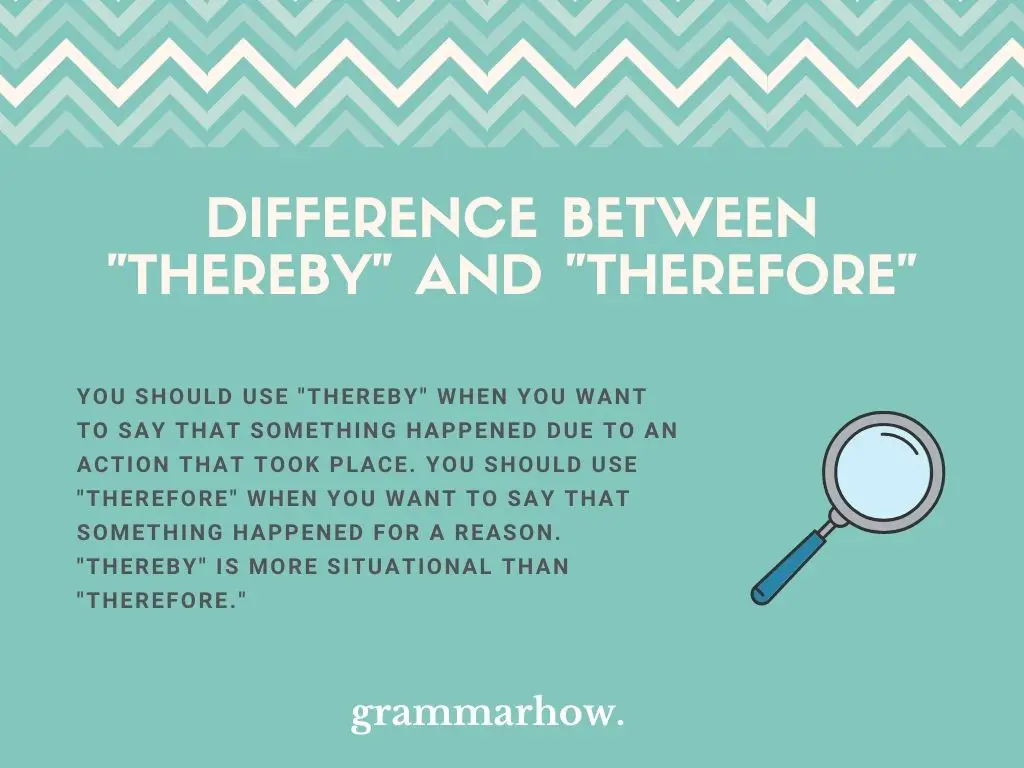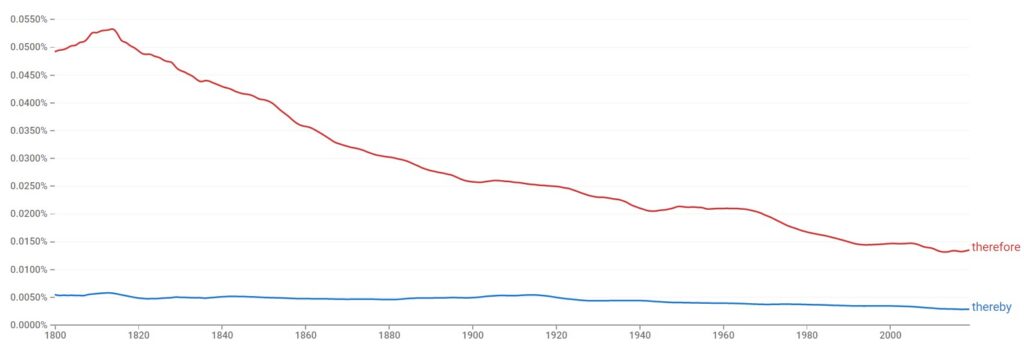“Thereby” and “therefore” are very similar words. There isn’t much difference between their general use, but there’s an easy way to be able to tell them apart. They’re not always used interchangeably, and in this article, we’ll explore that idea.
What Is The Difference Between “Thereby” And “Therefore”?
You should use “thereby” when you want to say that something happened due to an action that took place. You should use “therefore” when you want to say that something happened for a reason. “Thereby” is more situational than “therefore.”

The definition of “thereby,” according to The Cambridge Dictionary, is “as a result of this action.” That means that we talk about an action at the start of the sentence and finish the clause by using “thereby” to talk about its result.
The definition of “therefore,” according to The Cambridge Dictionary, is “for that reason.” That means something is linked to the previous clause and is usually related to the outcome or result.
As you can see, the two meanings are very similar. It’s important to know the key differences between them, but you’ll be surprised at how often we use them interchangeably.
What Does “Thereby” Mean?
We’ll start by defining them in greater detail, and this will help you understand the key features that set the words apart.
“Thereby” means that something has happened due to an action previously defined in the sentence. Typically, “thereby” comes after a comma, though this isn’t always necessary depending on sentence structure.
“Thereby” is helpful in formal situations. We can write it in essays or other research papers whenever necessary. It’s the perfect formal word we use to describe something that happened due to the effect of something else.
Don’t mistake the meaning of “thereby” with “therefore,” though. While many native speakers are happy to use them interchangeably, this isn’t the case. In formal documents, it’s much easier for the reader to tell them apart, so you should pay attention to which one works best.
What Does “Therefore” Mean?
To help you understand them, we’ll now define “therefore” and when it’s most appropriate.
“Therefore” means that something has happened for a reason. We can define the reason in the previous clause or start a new sentence with “therefore” if necessary.
No matter how we use “therefore,” the meaning is always the same. You might notice the two meanings are almost identical, but there’s a key difference.
- Thereby:As a result
- Therefore:For that reason
We removed the rest of the meanings to showcase the two most important phrases in their definition. “Thereby” talks about the result of the previous incident, while “therefore” talks about a causal reason related to the last clause.
Basically, “therefore” provides an explanation for us to work with, while “thereby” explains why something results in something else. It’s a very fine line, but it’s present, and you should know about it before you try to use them.
Is “Thereby” Or “Therefore” Used The Most?
To help you understand them slightly better, we think it’ll help to see the popularity between the two words. That way, you can see which word is more likely to get used by native speakers.
According to this graph, “therefore” is the most popular word. It has been steadily declining over the last 200 years, while “thereby” has stayed at the same level, but it still hasn’t fallen below the popularity of “thereby.”

Also, according to Google, “therefore” is mentioned 170,000 times on The New York Times website, while “thereby” is mentioned 47,400 times.
We believe these statistics show you everything you need to know about the two words. It’s clear that “therefore” is the most popular of the two, and you’ll find more appropriate uses for it than you ever will with “thereby.”
However, since “therefore” is slowly declining over the years, there is a chance that at some point in the future, it will fall below the line of “thereby” It’s a very slim chance. Still, it may happen, which is why it’s essential to learn about both meanings if you ever need them.
Can “Thereby” And “Therefore” Ever Be Used Interchangeably?
We’ve spoken a lot about the similar meanings of the two. We also think there’s a case where they’re used interchangeably, and most native speakers won’t be able to tell you whether you’re wrong.
You can use “thereby” and “therefore” interchangeably when you want to talk about a result of something with a valid explanation. Usually, either “thereby” or “therefore” can be placed into the clause, and the meaning will still be worthwhile.
To demonstrate this, we want to show you a few examples:
- Exercise has been beneficial to the masses in recent years, thereby reducing the risk of heart disease.
- Exercise has been beneficial to the masses in recent years, therefore reducing the risk of heart disease.
In these examples, “thereby” is the most appropriate word to use. It’s talking about something that has happened “as a result” of something else. However, “therefore” is also suitable, and no one will tell you otherwise.
You can think of both of the phrases above as saying the following:
- Exercise has been beneficial to the masses in recent years because it reduces the risk of heart disease.
Using a word like “because” to demonstrate the meaning both convey is important here. It shows us exactly how to use them interchangeably, though this isn’t always possible, and you should only do it with caution.
Examples Of How To Use “Thereby” In A Sentence
Examples are a great way to learn all about new language rules. We’ll start by showing you some examples of using “thereby” in a sentence. Pay attention to the sentences we use here, so you know how to make them work better for yourself.
- The government is increasing taxes, thereby making it harder to live on minimum wage.
- We are working hard to correct our issues, thereby giving our customers a more pleasant experience.
- I’ve presented my project to the boss, thereby encouraging him to figure out the next steps.
- She hasn’t been around here for a few weeks; thereby, the apartment has been listed since she doesn’t appear interested anymore.
As you can see, we’re using “thereby” to talk about a result of the previous statement or clause.
You always use it to link back to the previous clause. You’ll never see “thereby” starting a sentence without a causal sentence coming before it to help us explain whatever result we’re talking about.
Examples Of How To Use “Therefore” In A Sentence
Now let’s check how “therefore” is different. If we can understand the meanings now, we’ll be setting ourselves up for plenty of success in the future.
- He isn’t here anymore; therefore, we’re closing the building.
- The school has sent the children home; therefore, they’ve closed early today.
- We can’t find anywhere nice to eat; therefore, we’re going to eat at home.
- I haven’t got the time to talk to you; therefore, you’ll have to find someone else to help you.
“Therefore” is more common to use as a conjunctive word. That means we’ll combine two clauses whenever we use “therefore.” The use of a semi-colon demonstrates this before the word and a comma after it.
Without that punctuation, “therefore” is rarely used.
Is “Thereby” Formal Or Informal?
Of the two words, “thereby” is regarded as the more formal. They’re both formal to some extent (though there is room for you to use them in informal situations).
“Thereby” is a formal word. We mainly use it when we’re talking about resulting factors in academic papers or research documents.
Both words are more formal than you’d expect, though. It’s not common for people to use either “thereby” or “therefore” in casual everyday speaking. Since speaking rules use more colloquial, informal rules, we often consider “therefore” and “thereby” pretentious and formal.
What Is The Difference Between “Thereby” And “Whereby”?
We use “thereby” to talk about a result of something happening from the previous clause. We use “whereby” to say that something happened by some kind of means. It usually doesn’t start a new clause.
- The state whereby I was born is one of the worst in the country.
As you can see here, the meanings for “whereby” and “thereby” vastly differ. We can’t use them interchangeably, as one uses “there” as the initial word, while the other uses “where.
Thereby – Synonyms
We believe that synonyms and alternatives are a great way to practice and learn new rules. If you’re struggling with the differences between “thereby” and “therefore,” these alternatives might help you to bridge the gap while you’re trying to figure them out.
- Due to
- Because of
- As a result
- Since
- As of
- Owing to
- On account of
These words and phrases are a great way to talk about things that have happened, resulting in something else. They’re also excellent to start a clause with, which makes them interchangeable with “thereby.”
Therefore – Synonyms
- Consequently
- Hence
- So
- Thus
- Accordingly
- Then
- On that account
“Therefore” and “thereby” are not synonymous. That’s why we need to use other words when we’re working with synonyms for “therefore.”
You may also like:
Comma Before or After Therefore: The Ultimate Guide (12 Examples)
12 Best Words To Use Instead Of “So”
Thus Far Vs So Far? Here’s The Difference (+14 Examples)
Thus vs. Therefore vs. Hence vs. So – Difference Explained

Martin holds a Master’s degree in Finance and International Business. He has six years of experience in professional communication with clients, executives, and colleagues. Furthermore, he has teaching experience from Aarhus University. Martin has been featured as an expert in communication and teaching on Forbes and Shopify. Read more about Martin here.
